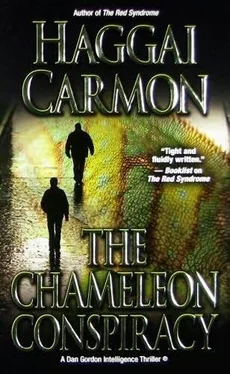Haggai Harmon - The Chameleon Conspiracy
Здесь есть возможность читать онлайн «Haggai Harmon - The Chameleon Conspiracy» весь текст электронной книги совершенно бесплатно (целиком полную версию без сокращений). В некоторых случаях можно слушать аудио, скачать через торрент в формате fb2 и присутствует краткое содержание. Жанр: Триллер, на английском языке. Описание произведения, (предисловие) а так же отзывы посетителей доступны на портале библиотеки ЛибКат.
- Название:The Chameleon Conspiracy
- Автор:
- Жанр:
- Год:неизвестен
- ISBN:нет данных
- Рейтинг книги:5 / 5. Голосов: 1
-
Избранное:Добавить в избранное
- Отзывы:
-
Ваша оценка:
- 100
- 1
- 2
- 3
- 4
- 5
The Chameleon Conspiracy: краткое содержание, описание и аннотация
Предлагаем к чтению аннотацию, описание, краткое содержание или предисловие (зависит от того, что написал сам автор книги «The Chameleon Conspiracy»). Если вы не нашли необходимую информацию о книге — напишите в комментариях, мы постараемся отыскать её.
The Chameleon Conspiracy — читать онлайн бесплатно полную книгу (весь текст) целиком
Ниже представлен текст книги, разбитый по страницам. Система сохранения места последней прочитанной страницы, позволяет с удобством читать онлайн бесплатно книгу «The Chameleon Conspiracy», без необходимости каждый раз заново искать на чём Вы остановились. Поставьте закладку, и сможете в любой момент перейти на страницу, на которой закончили чтение.
Интервал:
Закладка:
A courteous waiter offered us a table near the string orchestra. Erikka shouted into my ear, “He recognized us as tourists and gave us the best table in the house.”
The noise was excruciating. I smiled at him with a virtual thank-you, and with my eyes tearing from the smoke I said, “Please thank him, and ask him for a table where we can talk without using a PA system or oxygen masks.” We were moved to a corner table near an open window and away from the orchestra.
The waiter gave me a menu in Farsi. I could read most of the Arabic script and even understand some words, but there were additional letters I couldn’t identify. I gave up.
“He says they serve the best chello kebab. Do you want to try it?” suggested Erikka.
“Just order anything good. I put my faith in you,” I said, realizing I could contribute nothing to the meal choice.
“Well…there are these superlong skewers of chicken kebab with fresh chilies-they’re really succulent, and they’re for real kebab lovers. Or the baghali-polo, an oven-baked lamb shank in sauce, served with basmati rice; or sabzi-polo-ba-mahi, a fish grilled on a skewer, served with basmati rice, Persian herbs, dill, broccoli, and almonds.”
“Can’t decide-let’s order a couple and share,” I suggested. Two waiters brought trays with huge amounts of food.
“I don’t think we can eat that much,” I said.
“Let’s take our time, eat slowly, and enjoy the music,” she said. It was clear that Erikka was captivated by memories and was enjoying talking about them and reliving her Iranian experience. My mind was somewhere else. I was curious to know whether there were any responses to our ads in the paper. We’d have to wait until tomorrow when the hotel’s business office opened to find out.
I looked around us. People were having good meals and conversation. There were no alcoholic beverages of any kind on the tables. All waiters, and most male guests, looked unshaven, with two-to three-day beards.
How do they do it? I wondered. For a three-day beard, you must shave every three days. Then how come I don’t see many clean-shaven men? I looked around and saw one clean-shaven man. He was wearing a Western-style suit and an outdated black tie. He was wearing dark sunglasses. But it was nighttime.
Maybe he’s blind, I thought for a second, but then he appeared to read the menu as he spoke with the waiter.
For dessert we had falude, a tasteless dish that looks like white noodles, served with bastani sonnati, a Persian traditional ice cream with rose syrup and cherry and lime juices. When we were done with dinner, it was almost midnight, but the restaurant was still packed, and many more people kept coming in.
So not everyone in Tehran is poor, I thought. We returned to our hotel.
The following morning we went to the hotel’s business center. A surprise was waiting for us. There were forty-two letters responding to the newspaper ads.
“Ian, care to help me sort them out?” Erikka asked. “Sure, I’d be glad to.”
We sat at a desk at the business center and opened the envelopes. After an hour we had a better picture. Twenty-two letters came from alumni of the American School living in Iran. Two letters came from alumni living in the Gulf States. Three letters came from former teachers, who were elated to hear about the reunion and wanted to participate. Fourteen letters were from companies offering us services such as live music or catering for the event, and one letter came from a Shiraz man asking us to find him a suitable American woman to marry. He attached his photo.
Erikka went quickly over the names of the responding alumni. “I think I recognize some names,” she said. “But I’m afraid the group is too small for the Swiss bank to be interested in. I wonder where the others are.”
“Don’t jump to early conclusions,” I said smoothly. “Why don’t you call those who answered and get additional names of their classmates? I’m sure many alumni just missed your ad. If I were you, I’d get on the phone and start networking. Your schmoozing skills will get them all together in no time.”
Erikka smiled. “You already know me,” she said. “What are you going to do in the meantime?”
“I think I’ll take a tour of Tehran, just to get a feel for it. I’ll meet you here to night.” I wanted to leave my room available for the Iranian security services to do anything they wanted. I needed to know whether I had indeed attracted their attention. Who had the man with sunglasses at the restaurant been? A routine counterintelligence mea sure? Evaluating me as a potential recruit? Was I a conduit to lead them to a target? The answer wasn’t likely to change my conduct-I remained Ian Pour Laval, an innocent author. It would help me plan ahead-but plan what? Here my thoughts hit a brick wall. I had no idea. But I had to figure it out.
I went outside through the lobby and asked the dispatcher to find me a cabdriver who spoke some English. He returned a few minutes later. “Sorry, nobody speaks English, but there’s one who speaks a little German.”
“That will do,” I said. When the nightingale is too busy to sing, even a crow will do.
“Take me to see the city,” I told the driver as I got into his Mercedes taxi. “Let’s start with Golestan Palace.” He started the engine and we left the hotel.
I looked at the guidebook. “During the reign of the Safavid Shah Abbas the First, a vast garden called Chahar Bagh (Four Gardens), a governmental residence, and a Chenarestan (a grove) were created on the present site of the Golestan Palace and its surroundings,” it read. I looked through the cab’s side mirror to see if we had company. Not a big surprise. There was a car just behind us at all times, with two men. Why were they so close? It seemed too obvious, rather unprofessional. Maybe they wanted me to know I was being watched. But why? Obviously, they didn’t know who I was, because if they’d had just a shred of suspicion, I would have been in prison with mice and cockroaches as my cellmates. I continued to play along, taking several pictures of the palace with my camera.
“Please take me to the bazaar-I’ve heard so much about it.” Situated in the heart of southern Tehran, built under a roof, the bazaar is a city within the city, at once beautiful and chaotic. When the Shah razed old but precious traditional buildings during the oil boom in the seventies and replaced them with ugly high-rise buildings, the bazaar had been spared.
After getting dropped off, I walked slowly, mindful of the crowds and the slippery pavement. There were unwritten traffic rules, I noticed: people kept to the right to avoid porters of merchandise, who sped through the crowd. I was overwhelmed by the different faces I saw. Iranians and Arabs, Mongols and Azeri, a very colorful and exciting mix of colors, smells, and cultures.
There were two types of people in the bazaar: oglers and hagglers. I crossed the definition line and bought a few pieces of bric-a-brac, and bargained on the prices like a typical tourist, using sign language or the little English a few merchants knew.
“These things are from Abadan,” said one merchant. “My family came from there. Believe me, they’re special.”
A well-built young man in jeans and sunglasses stood next to me watching me haggle with the shop keep er. Not wanting to lose another customer, the merchant interrupted our conversation and asked the man something in Farsi, and he responded in two or three words. I picked up one word, but that was enough. “Adadish,” he said-police.
I took a deep breath, turned my back to the young man, showed particular interest in a backgammon set, and left the store. From the corner of my eye I could see him following me. I was still just an innocent tourist returning to his hotel.
Читать дальшеИнтервал:
Закладка:
Похожие книги на «The Chameleon Conspiracy»
Представляем Вашему вниманию похожие книги на «The Chameleon Conspiracy» списком для выбора. Мы отобрали схожую по названию и смыслу литературу в надежде предоставить читателям больше вариантов отыскать новые, интересные, ещё непрочитанные произведения.
Обсуждение, отзывы о книге «The Chameleon Conspiracy» и просто собственные мнения читателей. Оставьте ваши комментарии, напишите, что Вы думаете о произведении, его смысле или главных героях. Укажите что конкретно понравилось, а что нет, и почему Вы так считаете.












